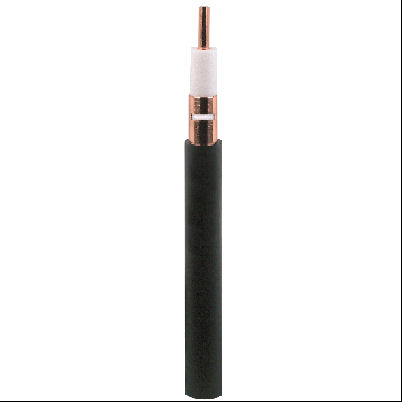RLKU12-50JFNA
1/2" RADIAFLEX® RLKU Cable, A-series
Rev : P1 | Rev date : 05 May 2017
- RADIAFLEX® functions as a distributed antenna to provide communications in tunnels, mines and large building complexes and is the solution for any application in confined areas.
- Slots in the copper outer conductor allow a controlled portion of the internal RF energy to be radiated into the surrounding environment. Conversely, a signal transmitted near the cable will couple into the slots and be carried along the cable length.
- RADIAFLEX® is used for both one-way and two-way communication systems and because of its broadband capability, a single radiating cable can handle multiple communication systems simultaneously.
- This RADIAFLEX® radiating cable utilize a low-loss cellular polyethylene foam dielectric and a smooth copper outer conductor which offers a superior electrical performance together with good bending properties.
FEATURES / BENEFITS
- Ultra wideband from 30 MHz to 2700 MHz
- For applications in tunnels and buildings
- Low coupling loss variations

RLK12-50JFNA
General Specifications |
|---|
| Size | | 1/2 |
|
Electrical Specifications |
|---|
| Max. Operating Frequency | MHz | 2700 | | Cable Type | | RLKU | | Impedance | Ohm | 50 +/- 2 | | Velocity, percent | % | 88 | | Capacitance | pF/m (pF/ft) | 76 (23.2) | | Inductance, uH/m (uH/ft) | µH/m (µH/ft) | 0.19 (0.058) | | DC-resistance inner conductor, ohm/km (ohm/1000ft) | Ω/km (Ω/1000ft) | 1.97 (0.6) | | DC-resistance outer conductor, ohm/km (ohm/1000ft) | Ω/km (Ω/1000ft) | 4.84 (1.48) | | Stop bands | MHz | 650-750, 1330-1430, 2025-2100 | | Frequency Selection | MHz | 600, 900, 1800/1900, 2200, 2400, 2500, 2700 |
|
Mechanical Specifications |
|---|
| Jacket | | JFN | | Jacket Description | | Halogen free, non corrosive, flame and fire retardant, low smoke, polyolefin | | Slot Design | | Groups of vertical slots at short intervals | | Inner Conductor Material | | Copper Clad Aluminum Wire | | Outer Conductor Material | | Overlapping Copper Strip | | Diameter Inner Conductor | mm (in) | 4.4 (0.17) | | Diameter Outer Conductor | mm (in) | 11.4 (0.45) | | Diameter over Jacket Nominal | mm (in) | 14.7 (0.58) | | Minimum Bending Radius, Single Bend | mm (in) | 200 (7.9) | | Cable Weight | kg/m (lb/ft) | 0.23 (0.16) | | Tensile Force | N (lb) | 1300 (292) | | Indication of Slot Alignment | | Bulge atop slots | | Recommended / Maximum Clamp Spacing | m (ft) | 0.5 (1.6) | | Minimum Distance to Wall | mm (in) | 80 (3.15) |
|
Testing and Environmental |
|---|
| Jacket Testing Methods | | Test methods for fire behaviour of cable :
IEC 60754-1/-2 smoke emission: halogen free, non corrosive
IEC 61034 low smoke
IEC 60332-1 flame retardant
IEC 60332-3-24 fire retardant
UL1666, ASTM E 662, NES711 and NES713 |
|
Temperature Specifications |
|---|
| Storage Temperature | °C(°F) | -70 to 85 (-94 to 185 ) | | Installation Temperature | °C(°F) | -25 to 60 (-13 to 140 ) | | Operation Temperature | °C(°F) | -40 to 85 (-40 to 185 ) |
|
Attenuation and Power Rating |
|---|
| Frequency, MHz | Longitudinal Loss, dB/100 m (dB/100 ft) | Coupling Loss 50%, dB | Coupling Loss 95%, dB |
| 75 |
2.17 (0.66) |
49 (53) |
59 (63) |
| 150 |
3.10 (0.94) |
57 (61) |
68 (72) |
| 450 |
5.74 (1.75) |
65 (68) |
76 (79) |
| 800 |
8.75 (2.67) |
57 (59) |
63 (65) |
| 870 |
9.21 (2.81) |
58 (60) |
64 (66) |
| 900 |
9.40 (2.86) |
58 (60) |
63 (66) |
| 960 |
9.73 (2.97) |
58 (60) |
64 (66) |
| 1800 |
21.97 (6.70) |
55 (57) |
65 (67) |
| 1900 |
22.71 (6.92) |
55 (57) |
65 (67) |
| 2000 |
23.48 (7.16) |
53 (56) |
65 (66) |
| 2200 |
25.47 (7.76) |
52 (55) |
60 (63) |
| 2400 |
27.93 (8.51) |
52 (54) |
60 (63) |
| 2600 |
30.50 (9.30) |
52 (54) |
60 (63) |
|
Notes
- Coupling loss as well as longitudinal attenuation of RADIAFLEX® cables are measured by the free space method according to IEC 61196-4.
- Coupling loss values are measured with a radial (below 650 MHz) or parallel (above 650 MHz) orientated dipole antenna.
- The coupling loss values given in brackets are average values of all three spatial orientations (radial, parallel and orthogonal) of dipole antenna.
- Coupling loss values are given with a tolerance of +5 dB and longitudinal loss values with a tolerance of +5%. Note: Measured values below nominal are better. They are not limited by any tolerance-range.
- In case of a conflict of operational and stop band, please contact RFS for further assistance.
- As with any radiating cable, the performance in building or tunnel environments may deviate from figures based on free space method.
;



